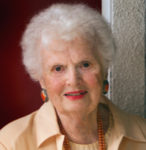By Natasha Josefowitz, ACSW, Ph.D.

LA JOLLA, Califorrnia — In 1971, at one of the monthly lectures held at the child-guidance clinic where I worked, Dr. Marshall Klaus came to talk about his research on maternal infant bonding. He had been to South America and the United States and was now studying the same in Switzerland. As the only bilingual staff member, I became his translator since he could not speak French. After his lecture, he asked if I would be willing to accompany him as his translator during his travels through Switzerland. At the time, I was working on my Ph.D. thesis on children services in French-speaking Switzerland and thought we would have similar interests. I accepted his offer.
During the long car rides we talked about his research; I contributed my ideas which he included in his book, Maternal Infant Bonding. The book emphasized the importance of this early relationship on the growth and well-being of the child, even into later years.
Upon returning home, he called to ask if I would be interested in meeting an American professor sent from Harvard University to start a satellite business school in Lausanne, as he had done in Calcutta and Amsterdam. He was looking for a social worker to work with him as consultants to a local hospital. I agreed to meet this professor. That evening I met Dr. Herman Gadon, and we decided that we could work together. This was the beginning of our consulting partnership.
Herman had many other consulting jobs in both non-profit and industry. In the 1960s encounter groups were taking off in the U.S. and becoming popular in Europe. Living in Switzerland, I had the opportunity to be trained in group dynamics, particularly in the Tavistock Method. So when Herman was approached to lead a week-long encounter group for executives of IBM International in Geneva, I joined him in this endeavor. We were a great team and went on to lead similar groups in other parts of Switzerland as well as in Paris.
At the end of Herman’s two-year assignment in Lausanne, having successfully launched IMEDE, the satellite Harvard Business School, it was time for him to return to the United States, where he helped to start a new business school at the University of New Hampshire. At the prospect of separation, we both acknowledged that we had fallen in love. Herman asked me to join him as a faculty member at UNH. Herman thought I would fit in as I taught using the casework method while the members of business faculty who were teaching the Harvard case method.
Both my children had graduated from high school and were enrolled in American colleges. Sam was seldom home, constantly traveling for his business, while I worked at the Lausanne School of Social Work and the Child Guidance Clinic. After 25 years of marriage, I was faced with a most difficult decision, both professionally and personally. Given the escalating and lengthy number of separations from Sam, I went out on a limb and followed Herman to the United States. I started my new life teaching at the University of New Hampshire (UNH), first as a visiting lecturer, then as an assistant professor, and eventually as an associate professor at the Whittemore School of Business and Economics (WSBE).
That first year in New Hampshire, we lived like gypsies, staying at the homes of various professors while they went on sabbatical leave. Moving around didn’t matter; we were happy together. Eventually we were able to buy our own home. It was a little house with the Oyster River flowing through the backyard. In the summer months, Herman would catch trout in the river. In the winter months the river would freeze; we cross-country skied on it together. On snowy days, the roads were not always plowed so we had to ski to our classrooms.
UNH was located in the small town of Durham, a lovely rural setting. It was a tight-knit, closed community which made it difficult for me to integrate. When Herman returned to the States with a red-headed Swiss woman and a French accent, it did not go over well in this small community. I was not welcomed at first and was excluded from social gatherings; this was a very tough time for me. UNH President Gene Mills and his wife Dottie made it their business to include me in their get-togethers to ensure that I would be seen as part of the legitimate faculty. I am forever grateful to them both for helping me to be accepted as a member of the university.
© Natasha Josefowitz. This article appeared initially in the La Jolla Village News. You may comment to natasha.josefowitz@sdjewishworld.com
So nice to read you again! I’ve missed your wit and wisdom.